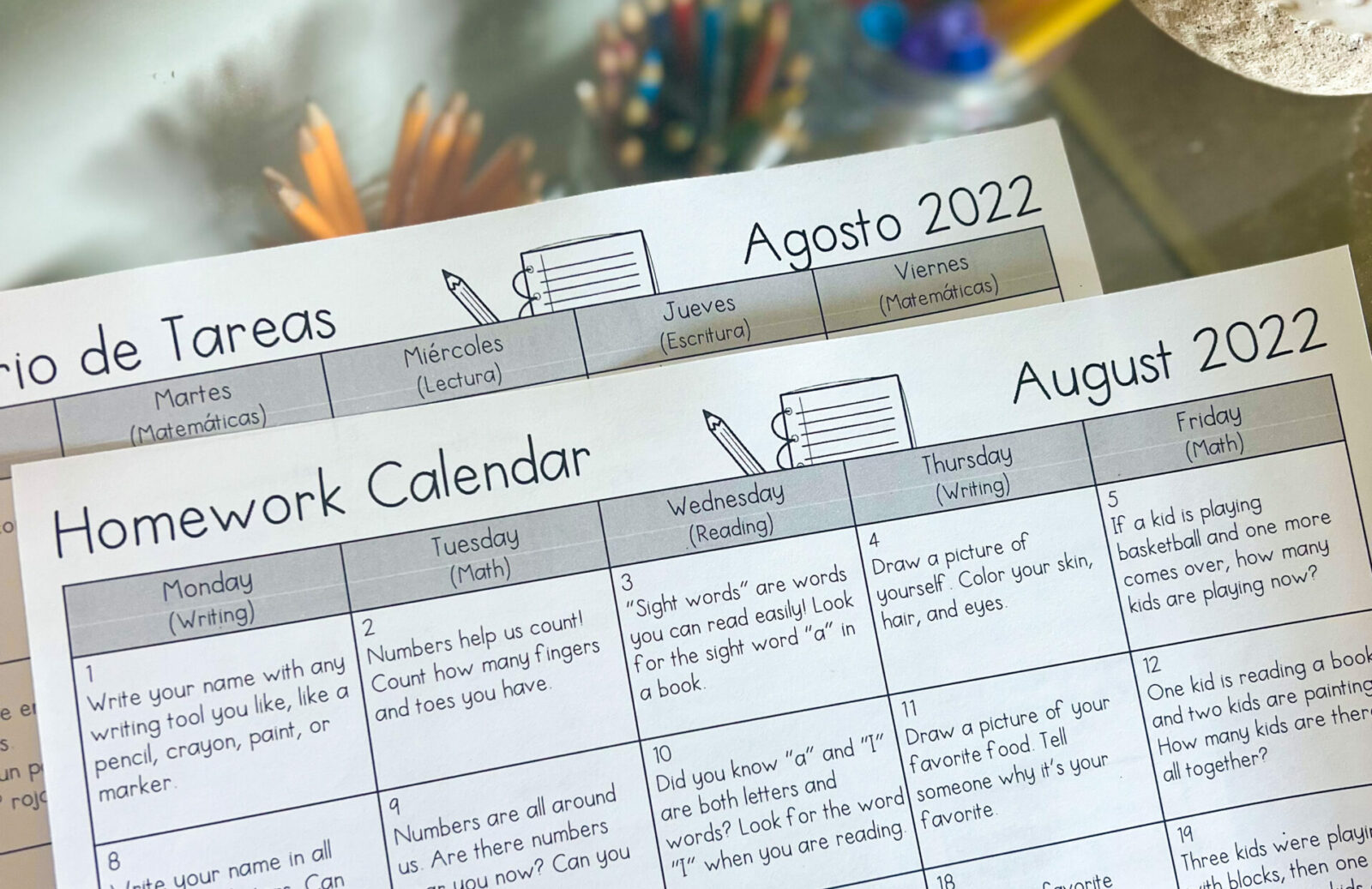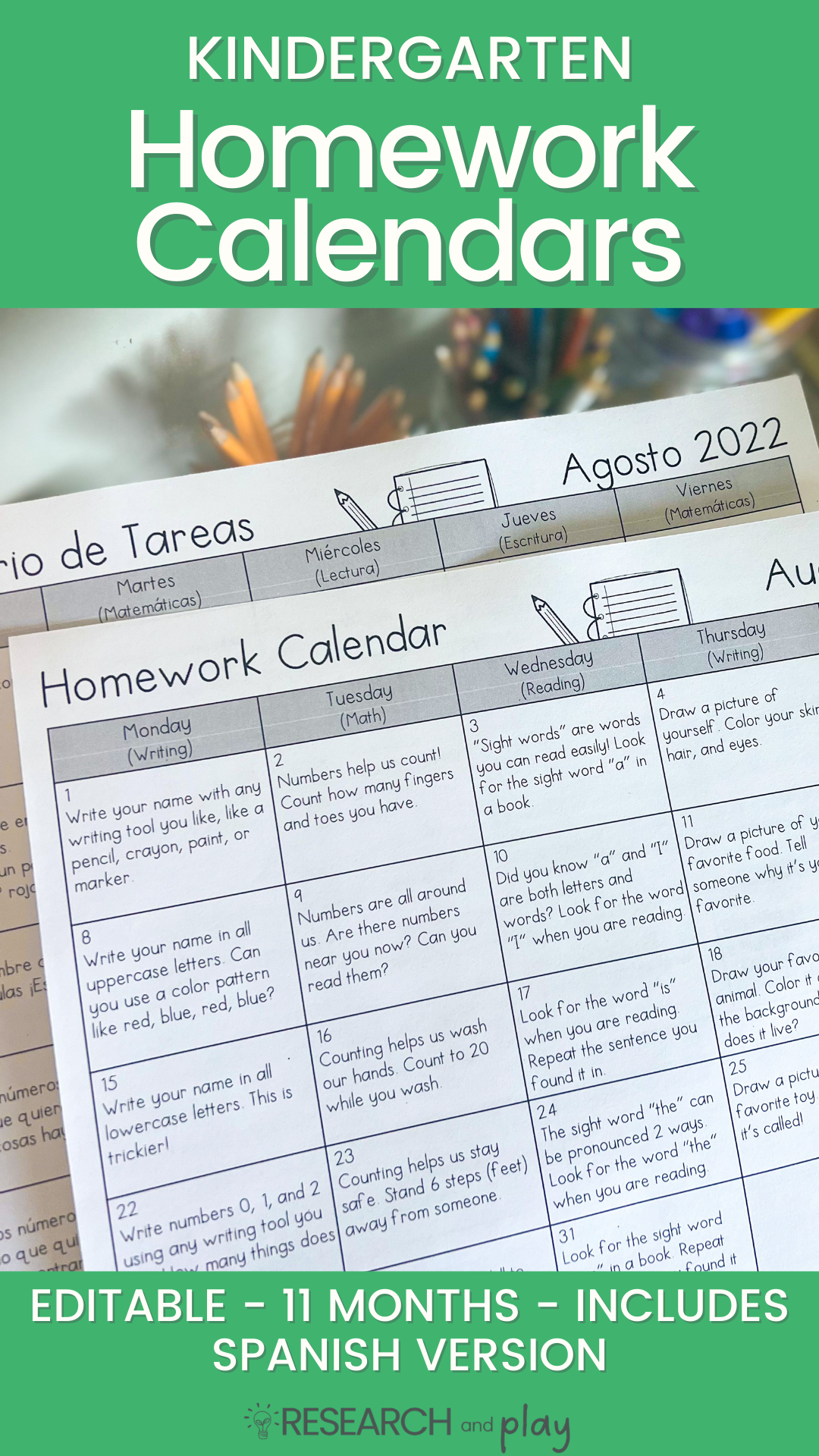Do you ever hear the word “homework” brought up in conversation and wonder what the next statement will be? No matter if I’m talking with fellow teachers, administrators, parents, or friends of mine with school-age children, conversations about homework can be intense because people have such strong feelings about it! There is a lot of talk out there both for and against homework. So, here’s what I think.
For most of my career I’ve taught kindergarten, and I’ve always given homework. Whether it was a thick packet of stapled workbook pages, monthly family projects, journal prompts, or homemade calendars with nightly tasks, homework has always been part of my teaching journey. I’ve seen the conversation around homework shift over the years, so I’ve done my fair share of reading research and looking into studies on homework’s effectiveness. I believe that homework in kindergarten should be the real-world application of skills learned at school, done in ways that will be clearly applicable to students’ lives, and it should be optional.
That last word usually gets the most reaction, especially when I tell families at Back to School Night in August. Some years, I’ve actually heard audible sighs of relief. My rationale behind making homework optional is that students are children first, and they should be given time outside of school to have experiences that help them grow, develop, and have fun. Children are also busier than ever with extracurricular activities, and families are crunched for time as it is. The last thing I want to do is put strain on a family because nightly homework hasn’t been done.
What I give to students is a monthly homework calendar. Each night, the task is hands-on, interactive, and (maybe) even fun! Homework in kindergarten is designed to be done with an adult and focused on conversation. Every day of the week has a theme so that parents are able to predict what kind of task will be done (writing on Mondays, counting on Tuesdays, reading on Wednesdays…). But if there is a busy night or the child is just too tired, homework can be skipped.
I absolutely love doing homework in kindergarten this way. I feel that it respects child development and family time. I love when students come in to school the morning after completing a fun homework task and are excited to tell me about it. I especially love hearing from parents who can’t believe they’re declaring homework time to be an enjoyable part of their night! I love sharing this model with other teachers in hopes of swaying them; however, I do get lots of questions about my homework, so I’d like to answer some of them:
What do you do if a student doesn’t do homework all year long?
Depends on the student. I’ve had students in the past whose homework I never saw, but the student was making good progress towards kindergarten goals. For those families, I never bring up homework. But there are other students whose homework I don’t see for the first part of the year, but I also don’t see progress towards kindergarten goals. For those students, I will talk with parents and ask that homework be required, at least for a period of time. If they are not meeting goals or performing at grade level, I’ve already talked with parents before this point. I want them to know that support at home is crucial and that I’ll be checking homework weekly.
How do you manage homework giving, checking, and collecting?
It all goes in their folders. I print the homework calendar, hole punch, and stick it in my students’ Take Home Folders at the beginning of every month. At the end of each month, I take out all of the previous months’ work and insert the new calendar. This is when I actually check to see who has done their homework and quickly glance through the papers (because some tasks are fun and I want to see their product!).
Is homework optional when they go to first grade? How do your students adjust?
It depends on the school! I’ve taught in schools where homework was optional in K-5, but at other schools homework became required in first grade. I do have the same homework calendars for first grade for any teachers who want to continue this approach! I would talk to families in the final months of kindergarten to make sure they realize that homework may not be optional next year. If I know homework will be required in first grade, I “gently encourage” all of my students to start doing their homework towards the end of the school year and create our Homework Club. All it means is that I check homework weekly for completeness. If a student has completed a week’s worth of homework, they are declared a member of the Homework Club! I don’t write down names anywhere publicly, but I announce, “___ is in Homework Club!” as I’m checking homework each Friday.
Homework in kindergarten can be simple for you and fun for your students. If you’d like to try homework calendars in your classroom, click on the picture below! It comes completely editable so you can change tasks or dates to best fit your classroom needs. It also includes a Spanish version of the calendars! Another bonus: When you purchase these calendars, which have activities from August-June, you’ll receive free updates every single year! No going in and changing dates or major holidays yourself. And if you want to require homework in kindergarten, I guess that’s okay, too!



I absolutely love your approach towards homework and making it optional is definitely one idea I've never heard before. Glad to see you diverting from the ordinary and thinking out of the box!
amazing idea especially for our special education teaching at our school. this will surely assist our young parents to spend quality, fun but educational time with the kids and it won't be seen as "homework" by the kids. you rock
This is very interesting! I'm considering a similar binder for next year for my firsties. I would like to include in it helpful pages such as our 1st grade sight words and helpful links/logins. What do you do about those kiddos that lose their binders or don't bring it back on Friday to be stuffed for the next week?
Hi Ashley! I've been using binders for about 5 years, and in my experience I've rarely had a student lose their binder. Last year it happened once, so after waiting a couple of weeks to see if she could find it, I made her a new one. I only "stuff" binders at the end of the month with new homework, newsletter, and lunch menu, so that's never really been a problem. The students put their own work in their binder daily if they have any paperwork to take home!
In my District homework is mandatory K-12. Kindergarten is required 10 minutes of homework a night, plus 20 minutes of reading. My Kindergarten Team has been torn over the years about giving our kiddos homework. Your calendars are exactly what we have been looking for and wanting to use with our kiddos as a more "fun", developmentally appropriate form of homework. I can't wait to share this with my team!! Thank you!